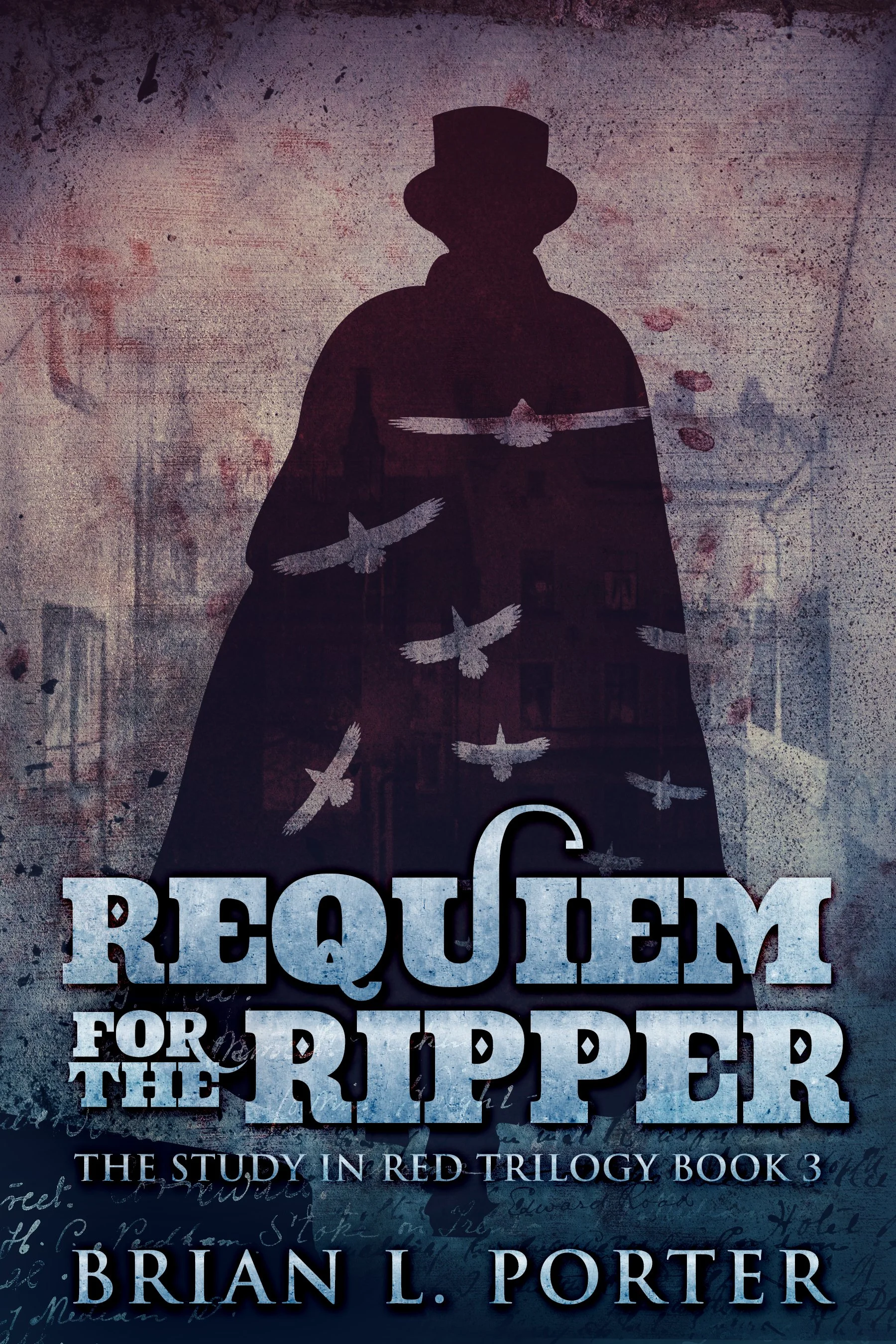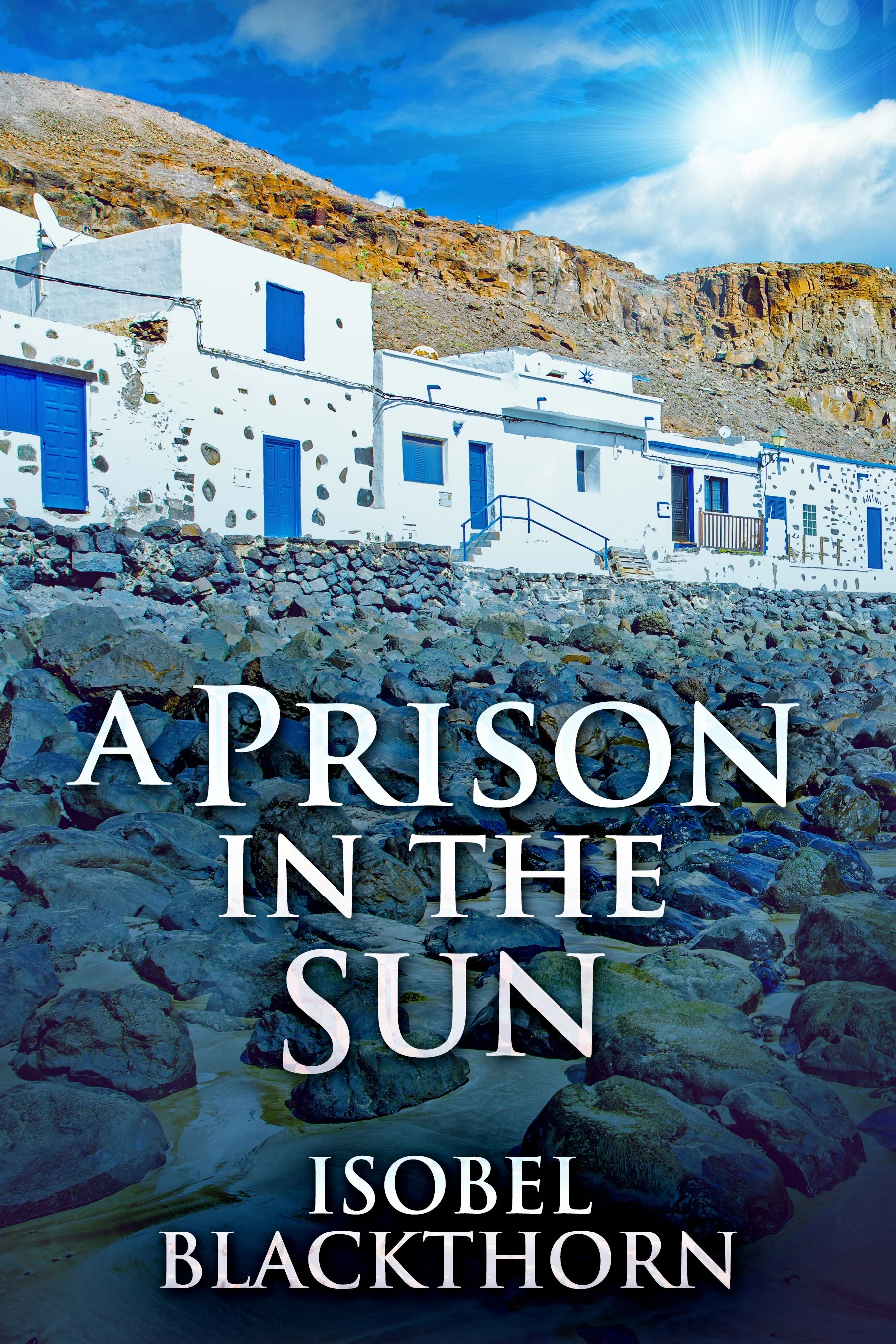Requiem For The Ripper (The Study In Red Trilogy Book 3)
Book summary
In "Requiem For The Ripper," William Forbes, haunted by the infamous Jack the Ripper, turns to criminal psychologist David Hemswell for help. Together with paranormal investigator Kate, they delve into a terrifying mystery on a remote Scottish island, Skerries Rock, leading to a chilling final confrontation.
Excerpt from Requiem For The Ripper (The Study In Red Trilogy Book 3)
Skerries Rock is, to most people who’ve heard of it, one of the most desolate and unwelcoming places in the whole of the British Isles. Lying just a mile off the coast of Cape Wrath, the most north-westerly point of the Scottish mainland, the island, which is rarely if ever shown on any maps is barely one and a half miles long and less than a half mile across at its widest point. Once home to a small band of hardy crofters who long ago abandoned their tiny homes and sought wealth, or at least a decent living on the mainland, it has long been my personal idyll, the place where if I could, I always promised myself I’d retire to one day, living in splendid isolation with nothing more than the seabirds and the sound of the constantly buffeting Atlantic winds for company.
I’d visited Skerries Rock as a child when my father had brought me to the place during a fishing trip. We’d hired a boat from the village of Balnakiel, where my ex-ship’s captain father was well known, and where he holidayed often, enjoying the panoramic views and the relaxation afforded by the local golf course and staying in the village’s only decent hotel. We landed on Skerries Rock on the third day of our fishing trip, accompanied by Hamish Foyle, and his son Angus who comprised the crew of the oddly named ‘Whispering Lady’. I never found out why the boat carried its odd name, but at ten years of age such things were of little interest to me.
What did catch my attention however was the sheer beauty of the tiny island that my father had brought me to. Small as it may have been, it held a grandeur that penetrated my young mind and left a lasting impression upon me. On the cliffs that appeared to rise almost vertically from the sea on its eastern shore, I watched in awe as thousands (or so I estimated) of puffins with their brightly coloured beaks nestled together, gathered, as my father explained, for their annual mating season. Dolphins broke through the dark blue-green surface of the ocean as we approached the only practical landing point a mile east of the towering cliffs. Here a small wooden quay jutted out from a rocky beach. It stood in good repair, and Hamish Foyle explained that the crofters who once lived on the Rock had used this place for the receiving of supplies from the mainland, and also for putting to sea in their own small fishing boats, from which they’d cast their nets close to shore in an attempt to augment their supplies with a regular infusion of fresh fish. They’d possessed the sense to build the quay on the leeward side of the island where a degree of shelter from the towering Atlantic breakers existed. Anywhere else on the island would have made landing ashore a physical impossibility. When not in use, their small but highly seaworthy fishing vessels would be hauled by hand onto the shore, where they’d await their owners’ next voyage out to sea.
Nowadays, Hamish told me, the island was privately owned and only rarely visited by birdwatchers and conservationists. The owner, a philanthropic millionaire, had decreed that the quay be kept in good repair so that those who wished to land and take advantage of the sights and sounds of the island could do so.
I think my father knew I’d be captivated by the place. He knew only too well that his son had a love for the natural world and for all the creatures that inhabit it, and the puffins and the myriad gulls, terns, skuas and petrels that swirled in the skies above us made the whole place seem alive. I felt as though I’d stumbled on to one of the last truly wild places on Earth, and perhaps I had.
The place left such an impression on my receptive young mind that memories of Skerries Rock filled my head so many times during my teenage years and I would beg my father to take me there whenever he visited Scotland. My mother, reconciled to the knowledge that her husband and son were about to embark on one of their treks to the north, would usually remain at home in our comfortable house in the port of Hull on the East Coast of Yorkshire, and I’d cheerfully wave goodbye to her and sadly, scarcely give her another thought as we headed towards the border, following the coast road along the east coast and them traversing the width of Scotland once Edinburgh trailed in the wake of our exhaust. I say sadly, because, shortly after I’d attained the age of sixteen, my mother fell victim to a cruel cancer and within six months of her contracting the dreaded disease, she’d passed away, and my father and I were left alone with our joint grief and horror at the ravages the illness had wrought in my poor mother.
So it transpired that years passed without another visit to Skerries Rock, years in which I attended university, gained a degree and slowly built a career for myself. I became successful in my chosen profession and became able to afford to ensconce myself in a house that overlooked the North Sea in the coastal resort of Scarborough, a brass plaque on the wall announcing my trade and my surgery hours, from where I carried out my work as a consultant psychologist. I carried out much of that work of course at the local hospital, and as time passed and my star rose, I became known to the police as something of an expert in the field of criminal psychology, not only in the local area but across the north of England and I was often called in to provide suspect profiling in cases where such expertise was required or desired.
As with many childhood dreams, my thoughts of Skerries Rock remained firmly embedded in my mind, though they grew fainter and less vivid with the passage of time. I would occasionally promise myself that I’d visit the place again one day, but after the death of my father, (another awful cancer, dammit), fifteen years after the loss of my mother, such ambitions assumed less of a priority in my life.
My success continued and then, at the age of fifty, while idly reading through a copy of The Times one day as I waited for lunch to be served in my favourite restaurant, my eyes were suddenly drawn to an advertisement on the property page.
The words Skerries Rock leaped out at me from the page as I read the advertisement offering my dream island for sale!
I could scarcely believe my eyes. The millionaire philanthropist who’d originally bought the place had died and the executors of his estate were selling Skerries Rock for a knock-down price. After all, they’d probably surmised, who the hell would want to own such a place, even less likely, who might want to live there? They probably saw the tiny island as an encumbrance to the estate and seemed to be determined to off-load it quickly, or so the asking price implied.
From that day forward the idea of owning Skerries Rock and having the opportunity to live my childhood dream became an obsession. I’d become financially sound, certainly I could afford the asking price, and I quickly came to the conclusion that I could also easily give up my general practice in Scarborough and augment my income through consultancy work which could just as easily be conducted from a home on the island. After all, most of such work came via the internet and the telephone, and therein I realised the enormity of what I’d just suggested to myself. Skerries Rock possessed no mains electricity supply, nor gas or telephone links to the mainland. It would take some creative thinking and a fair amount of investment to install a private generator and arrange for a telephone line to be installed.
My mind had been made up however, and I knew I had to try. So, with a lot of help from my solicitor, I found myself able to place a ridiculously low bid for the island of my dreams that even I was surprised to find accepted by the executors of the estate. The generator cost less than I’d anticipated, and the telephone line wouldn’t be a problem with the advances in modern technology. All I had to do was build a habitable home for myself and Skerries Rock could become my home. I hired a team of builders from Balnakiel, in fact, the only builders in Balnakiel, owned oddly enough by Angus Foyle, with whom I’d first set sight on the island. In less than six months he and his men had converted two of the old crofts into a single, warmly insulated and completely adequate dwelling for a single man such as me. Power came from the use of the newly acquired generator, the telephone and computer links were soon established and in far less time than I’d imagined I found myself unscrewing the brass plaque from the wall outside my Scarborough home. As I took it down from its place of prominence I read it one last time. Listing my name, David Hemswell, and my professional qualifications, that plaque seemed at that moment to stand for everything I’d worked so hard to achieve and was now poised to leave behind. I placed it almost reverently into one of the packing cases that would be used to transport my goods and chattels northwards and left the house on a warm Saturday afternoon in June, without looking back once as I drove towards my future.
#
In less than a year, I’d made myself feel totally at home in my new environment. As I’d expected, consultancy work came my way on a regular basis, and I found myself easily able to attend to most of it through the mediums of computer or telephone. Only twice did I deem it necessary to leave the island and conduct hands-on inquiries in connection with a couple of rather complicated cases that had been presented to me by the police. I’d spend time each day walking and observing the life that abounded on my own personal dream world. Little appeared to have changed since my childhood days. Puffins and gulls and all the other seabirds still used my island as their home, at least for the time they required to set foot on dry land. Entire pods of dolphins continued to make their presence known, occasionally leaping from the sea, riding the waves in playful abandon until they’d become bored with their game and disappear once more beneath the mantle of the Atlantic waves. The wind would howl, not fearfully, but as a lullaby that would gently send me to sleep each night, blissfully happy and contented with my place in the world. Skerries Rock had become my world at that point, and I felt as though nothing could ever bring discord or disharmony into my new life. I found myself living the idyllic life I’d dreamed of living since my childhood. I felt supremely happy, happier than I’d ever believed possible. With no wife, no family ties and no one to answer to except my own conscience, I now entered without doubt the happiest period of my life.
The only thing I hadn’t factored in to my new life, my world of tranquillity and being at one with nature was the telephone call that I received one dark winter’s night in January.
“Doctor Hemswell?” a stranger’s voice inquired when I picked up the receiver.
“Yes, who’s speaking, please?”
“You don’t know me Doctor, but I’ve heard of you and your reputation. I got your number from Chief Inspector Gould of the Strathclyde Police. He said you were the best man to help with my, er, problem. I wondered if I might visit you and talk to you about a matter of the gravest importance.”
“I’m sorry, but I don’t even know your name yet, or what this matter of importance is. Could you please enlighten me before I agree to any sort of meeting? I don’t usually receive visitors here you know. I am rather isolated.”
“Yes, I know. You live on a private island off the coast of Cape Wrath. Chief Inspector Gould told me about it.”
“Correct. Now, your story?”
“Oh, yes, I’m sorry. Allow me to introduce myself. My name is Forbes, William Forbes, and until recently I was a solicitor. That is, until something odd began to happen and I found myself becoming embroiled in something I didn’t, and still don’t understand.”
“Mr. Forbes, you’re not making a lot of sense,” I said, in an attempt to force the caller to get to the point.
“Yes, I know, I apologise. Look, have you heard of Jack Reid, Doctor?”
“Yes of course, I think almost everyone has. He was accused of a series of copycat crimes that mirrored Jack the Ripper’s Whitechapel murders, was convicted, then released from a secure hospital due to new evidence, then years later he was convicted of another series of murders. Is that the Jack Reid you mean?”
“Yes, that’s him. Look, Doctor Hemswell, I know it sounds preposterous, and you’ll think I’m mad, but, well, Jack Reid was my client and he died a few weeks ago. Since then I’ve come into possession of a document that makes me believe things I don’t want to believe, and I admit to being in fear for my life. Please, I don’t want to say too much on the telephone. I’m begging you doctor, please let me come and see you and talk to you in person. Perhaps then you’ll understand what I’m getting at.”
The Jack Reid case had become notorious in the recent annals of crime. Only a fool or someone who’d been shut away on a desert island for years could have failed to possess at least a rudimentary knowledge of the so-called ‘Ripper Copycat’ killer who had stalked the streets of Brighton and finally, Whitechapel itself in his fiendish lust to recreate the murders of Jack the Ripper. Somehow, this man had become embroiled in the life and the case of Jack Reid and though he sounded agitated and afraid, his occupation at least merited granting him a little leeway.
“Listen Mr Forbes. You say you feel as though your life is in danger and yet you also tell me that Reid died a short time ago. I hadn’t heard of his demise, but please, all things being equal, who do you believe you’re in danger from?”
Just before the man replied a sudden howling gust of wind shook the house, and perhaps that same blast of chilled Atlantic air caused the generator to miss a beat and made the lights flicker briefly off, and then on again. His voice, when it came, delivered his reply in a deadpan, totally serious monotone.
“Who? Why, Jack the Ripper of course.”
From that moment onwards, life at Skerries Rock would never be quite the same again. Without knowing if my new client were deranged or just deluded in some way, I gave him directions and agreed to meet with him two days hence. I’d rendezvous with him on the mainland in my own motor launch and ferry him to the island. I explained that I wasn’t geared up for receiving guests, but he assured me he expected nothing from me except the opportunity to talk and to show me the document which he insisted had been the cause of so much of his current grief.
Finalising the conversation, I said my goodbyes to the mysterious Mr Forbes, and sat thoughtfully ruminating on our conversation for a minute. He’d said very little and given away even less and yet here I sat, ready to receive this stranger in to my home, a man who appeared to be under the delusion that his life was in danger from a serial killer who’d died over a hundred and twenty years ago.
The lights suddenly dimmed once more, the wind gathered in intensity and the windows of my home, despite being triple glazed to keep out the wind and the draughts, visibly appeared to shake in their frames. I made a mental note to check the fuel lines to my oil-fired generator in the light of the following morning and turned in for the night, though in truth, my mind felt more disturbed than I’d imagined at the strange phone call from Mr William Forbes, and sleep eluded me until the sheer weight of exhaustion forced my eyes to finally close at a little before three in the morning.
After a mere three hours sleep. I woke as usual at six a.m. only to find that the generator had failed during the night. I found myself without heat, light and power of any description. Forbes would be arriving the next day and it appeared I had much work to do. The wind had died, and the sea rolled in to the island in a gentle flat calm, unusual at any time of the year on Skerries Rock. As I worked on restoring power to my isolated home that day, even the sounds of the seabird’s calls sounded muted, and an air of hesitant expectancy appeared to presage the arrival of William Forbes, solicitor, of London.

















Praesent id libero id metus varius consectetur ac eget diam. Nulla felis nunc, consequat laoreet lacus id.